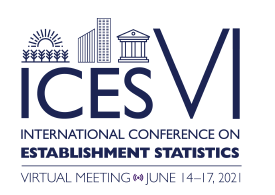All Times ET
Program is Subject to Change
TBD
Improving the Quality of Administrative Data at Their Source: Two Case Studies Applying Cognitive Methods to Developing and Testing Regulatory Forms (308011)
*Aryn Hernandez, U.S. Census BureauRebecca Keegan, U.S. Census Bureau
Kristin Stettler, U.S. Census Bureau
Keywords: Establishments, Administratvie data, cognitive testing, usability testing
Many U.S. businesses are required to complete regulatory forms every year, creating administrative records for governmental use. Whether businesses are submitting these forms to obtain approval to participate in a government program or to report incidents that concern public safety, data quality is paramount. Much of the current administrative data research focuses on replacing or supplementing survey data with administrative data. Considering the increased usage of administrative data, it is important to look at the quality of these records and develop a methodology for improving these forms and the quality of the data collected by them. Much like establishment surveys, regulatory forms require business staff to comprehend data requests, identify relevant staff required, retrieve any necessary records, communicate their response, and potentially obtain approval of superiors prior to form submission. Given that survey research methodology, such as cognitive testing, has been shown to improve data quality for establishment surveys, researchers at the U.S. Census Bureau have been engaged to apply these methods to improve the data quality obtained by regulatory forms. In this paper, we will present two case studies in which cognitive interviewing and usability testing techniques were employed to evaluate forms used for regulatory purposes. The first study evaluated a form used by small grocers to obtain government approval to accept food stamps from consumers. This multi-mode form requires detailed demographic data for all store owners, as well as detailed inventory information. The second study evaluated a form used for reporting adverse incidents that occur while transporting hazardous materials to assess old, potentially obsolete, questions. In addition, exploratory research was conducted on the respondents’ understanding and familiarity with the concepts being addressed in the regulatory forms, and the terminology that they use in reference to these concepts.
